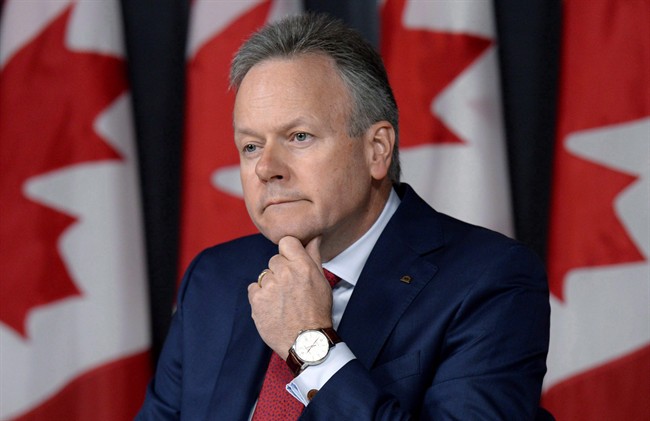The perplexingly persistent sluggishness of exports has slowed Canada’s adjustment to low oil prices, the country’s central banker said Saturday.

The problem continues to confound, Stephen Poloz said.
Canada is relying on an anticipated jump in non-commodity exports, abetted by a lower dollar, to offset the pain of lacklustre oil prices in a transition Poloz said should take three to five years.
But it’s happening slowly.
READ MORE: Canadian families should plan for lower retirement income
“We’re going to report more on that in a couple of weeks,” the Bank of Canada governor told reporters during international financial meetings. “But it’s our lack of understanding that causes us to say something like… there’s a level gap between where we thought the economy would be… and where it actually is.”
The latest statistics from the federal government actually show an annualized decline in exports of 2.5 per cent so far in 2016, explained partly by the summer fires that interrupted oil production in Alberta. Yet it goes beyond oil: industrial products have also suffered declines. Exports have grown to most countries, with one very notable exception: they’re down to the U.S., Canada’s undisputed No. 1 trading partner.
Poloz says he still believes a successful transition will happen — albeit slower than expected.
- Life in the forest: How Stanley Park’s longest resident survived a changing landscape
- ‘They knew’: Victims of sexual abuse by Ontario youth leader sue Anglican Church
- Buzz kill? Gen Z less interested in coffee than older Canadians, survey shows
- Mental health support still lacking 4 years after mass shooting: Nova Scotia mayor
READ MORE: Raising concerns about economy, Bank of Canada keeps key interest rate unchanged at 0.5%
“We still believe in the fundamental story. We still believe the economy is adjusting. We often use the word, ‘rotating.’… “Are we disappointed at the rate at which that thing is coming true? Absolutely… (Cheaper oil) arguably set up a three- to five-year adjustment process. So we probably have another year of truly visible adjustment to the oil-price shock. Give or take.”
Poloz said help is on the way.
He said the economy should soon record a boost from government actions. He said the process is likely unfolding already with the new government’s Canada Child Benefit rolling out to families. Then he said the multi billion-dollar infrastructure program will create additional economic gains within a year, although the pace is harder to predict because the details of individual projects aren’t all worked out yet.
“The fiscal effects that we’ve talked about should be showing up in the data at anytime now,” he said. “The child-care benefit is quite significant. I’m sure we’re going to see the effects of that in the fall retail-sales data.”
WATCH: ‘Total gong show’: Parents reveal flaws of child-care subsidy system
He said he’s keeping an eye on news about Germany’s Deutsche Bank — its shares have dropped nearly half this year amid low profits and news that the U.S. $14 billion payment to settle an investigation into bonds backed by risky mortgages. He said any financial-stability issue of a big institution has wide-ranging implications, “So everybody’s watching that with considerable interest.”
But he concluded on a note of optimism, albeit of a distinctly modest variety.
As he wrapped up a chat with Canadian reporters at the meetings in Washington, Poloz said on his way out the door: “The situation continues to be okay. We’re creating jobs. Growth is low, but it’s not zero. It’s moving. In the U.S., the economy is solid. There you go.”



Comments